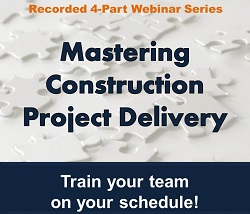Mastering Project Delivery and Choosing the Platform That's Right for You Download this four-part series to learn best practices for construction project delivery that fits your goals. It's a fact - successful construction projects require three essential components: collaboration, a workable schedule and proper contract administration. Whether design-bid-build, design-build, CM at Risk, or IPD, collaboration between the owner, design team, contractor and construction manager enables early identification of risks and least-cost solutions, reducing or avoiding contentious claims and adversarial posturing.
Session I Making Guaranteed Maximum Price (GMP) Contracts Work for You Presented by: Richard Burnham Great explanation of the GMP format and what to look out for. Anonymous Participant
Littleton, CO Rick is very knowledgeable and provided valuable information and guidance about the GMP contracts. Anonymous Participant
San Diego, CA As a newcomer to the construction industry, Mr. Burnham explained the GMP process extremely well. Anonymous Participant
Phoenix, AZ |
The pace of life seems to just get faster and faster, and construction projects are no exception. As owners have searched for project delivery systems that reduce the time it takes to get from project conception to project completion, one of the most common approaches has been the use of guaranteed maximum price, or GMP, contracts. As the use of the GMP contract format has proliferated, so have disputes. The nature of many of these disputes strongly suggests that the parties using them do not fully understand (a) the differences between GMP contracts and the contracts that the users are accustomed to working under or (b) the risks that are inherent to this delivery system. Topics include an in-depth description and analysis of the advantages and disadvantages of this contracting format, the four phases of work that are typical when working under a GMP format, the components of a GMP contract, and why it is so important to fully understand how each is defined and the conditions that apply to the payment of each component. In addition, this recorded webinar discusses the things to do and not do during each of these phases, administrative burdens placed on each of the parties when using this contracting format, what a change is under a GMP contract, and how it is different than changes under other contracts and how contractors may need to change their standard subcontracts when working on a GMP project. Listen to this information-packed, 90-minute recorded webinar to: - Understand the fundamental differences between GMP contracts and other contracts
- Learn the components of the GMP contract and how each component is administered as work proceeds
- Recognize the four phases of work when working under a GMP format
- Discover how the work done during each phase can affect the likelihood of success
- Define what a change is under a GMP contract
- And much, much more!
Session II Design-Build Contracts: Understand Administrative Challenges, Risks & Keys to Success Presented by: Richard Burnham As owners continue to search for faster and more cost-effective ways to procure their projects and as they continue to search for the best project delivery method for each of their projects, the use of the Design-Build format is becoming more and more common. This continuing thrust by owners has led many state legislatures to enact new regulations that change traditional licensing laws that had been impeding the use of this method. The move toward more innovative delivery methods like Design-Build has led to the surety community finding ways to deal with the risks that these new formats present to their traditional underwriting calculus. And it has also led contractors, designers (and their lawyers) to become more aware of the risks presented by these new forms of agreements and to explore joint ventures, new forms of subcontract agreements and insurance products that enable them to grow more comfortable with the format. The seminar was interesting and targeted. My experience was positive. Anonymous Participant It was really interesting, knowledgeable, simple and straight to the point. Donald Obando Very thorough. Anonymous Participant |
Yet the number of troubled Design-Build projects continues to suggest that many of the wrinkles are still being ironed out of this relatively new format and that not all in the contracting community are fully prepared to meet the risks and challenges that Design-Build work presents. This program will clearly present what the unique burdens are in the Design-Build context. More importantly, this recorded webinar explains how to meet the challenges that those burdens present. The materials used by the experienced instructor explain both the differences in the administration of Design-Build contracts and the differences in the management of the risks that this format presents to each of the stakeholders. The instructor has hands-on experience with this format from each of the contracting perspectives - he has dealt with it on behalf of owners, contractors and designers. Accordingly, this webinar recording explains the challenges and the methods for meeting those challenges from each of those perspectives. Topics include an in-depth description and analysis of the advantages and disadvantages of this contracting format and an explanation of why the Design-Build format is becoming more common. The materials will describe the up-front burden that must be met by the owner and its consultants in preparing and articulating project requirements, and examples that demonstrate methods for meeting that burden are explored and presented. The instructor describes factors that the owner and its consultants should consider when determining what should be in the request for quotation (RFQ) and the request for proposal (RFP), and how to develop and implement the Design-Builder selection process. The design review process that takes place as the Design-Builder proceeds with its work can be a fertile territory for disputes and misunderstandings, so a segment of the webinar is devoted to setting forth design review do’s and don’ts. Differences in how to identify and measure “changes” in the Design-Build context will be explained. This program will help you to: - Understand the fundamental differences between Design-Build contracts and other contracts
- Articulate why this project delivery method is becoming more common and what tools stakeholders are using to enter into the Design-Build arena
- Find ways to better meet the challenge of articulating a complete and effective set of project requirements
- Learn what an RFQ should focus on
- Get a better understanding of what the RFP needs to include and see examples of effective outlines
- Evaluate how and why the submittal process is more important in the Design-Build context
- Design review do’s and don’ts for both submitters and reviewers
- Understand how and why the definition of a change is different when working in the Design-Build context
- And much, much more!
Session III The Fundamentals of Joint Ventures in Construction Presented by: Richard E. Burnham If you understand the risks of Joint Venturing and are prepared to meet them, the use of Joint Ventures may be a relatively low-cost, low-risk way to expand a contractor’s experience, geographical market, and technical expertise. Owners will also benefit from learning more about Joint Ventures – what to look for and require of Joint Ventures and what having a Joint Venturer performing their work may mean to them. This online presentation will help Owners understand that Joint Ventures may result in their work being performed by entities with broader experience and expertise, and greater financial capacity. The webinar was very helpful in the understanding of Joint Ventures. There is not much information out there covering exactly how to use and implement JV agreements and how to structure them once you are there. Very helpful. Keith David, MBE, DBE, SBE/MC,8a
Bakersfield, CA Very well organized. David Dixon
Marietta, GA I thought that the webinar was very informative. Anonymous Participant
Ham Lake, MN |
Learn why, in an industry that is filled with fiercely competitive and independent-minded risk-takers, we so often see competitors come together to form Joint Ventures to pursue and perform work on construction projects in the USA and around the world. This webinar will explore this paradox, and the participants will learn not only why it is happening, but how it can work for them. This 90-minute recorded session, which is presented in a simple and straightforward manner by a professional with years of hands-on experience in the negotiation, drafting and administration of Joint Venture Agreements, will highlight basic differences and alert you to the unique risks of Joint Ventures. This important program will help you: - Understand what a Joint Venture is and why we are seeing so many more
- Review how the adverse economy is driving this phenomenon
- Learn how a Joint Venture gets formed and what you need to know about Joint Venture agreements
- Compare how Owners, Contractors, and Sureties view Joint Ventures
- Determine the unique management challenges presented by Joint Ventures
- Learn how Joint Ventures can benefit your business
- Recognize the “basics” that you need to know about Joint Ventures
- Assess some common risks that are inherent in Joint Venturing and learn how they can be managed
- Be prepared for what could go wrong
- And much, much more!
Session IV Lessons Learned: Recent Developments in Design-Build Case Law Presented by: Michael Loulakis, Capital Project Strategies, LLC The promise of design-build has been shorter schedules with fewer disputes. In theory, having the contractor and designer on the same team should eliminate the bulk of construction disputes: contract interpretation, design clarifications, RFIs and coordination issues, and reduce others such as differing site conditions. In addition, the owner should realize other benefits by having contractor input during the design stage, the elimination of the contractor selection phase and the ability to start construction before 100% design completion. Has the reality measured up? Is design-build the way to go? What are the caveats? Where are the crevasses and sinkholes? Listen to the presentation as Mike Loulakis, one of the country's leading authorities on design-build, reviews the design-build case law for the past two years. Mike regularly presents case law updates at the annual meeting of the Design-Build Institute of America (DBIA), where he focuses on the facts of the decision and lessons to be learned from the disposition. Excellent survey approach to recent developments. Lessons-learned context (e.g., suggested best practices) was particularly useful in helping convert the rule of law into practice. Case law cites would help for those who are interested in following up by reading the opinions, etc. Peter Simons
Port of Galveston Great presentation that explained the cases and put them in the context of trends and themes of design-build. Anonymous Participant |
This session's cases discuss such topics as: - What happens when the design-builder’s proposal differs from the RFP requirements
- The enforceability of limitations of liability in design subcontracts
- Disputes arising from the failure of the design-builder to properly manage the design process
- Successful and unsuccessful bid protests
- The impact of an owner’s misleading information on the success of differing site conditions claims
- And much, much more!
*BONUS SESSION Alternate Project Delivery Claims Presented by: Richard Burnham & Mark Nagata, PSP Learn best practices for dealing with claims for design-build, GMP and other delivery methods. Alternate project delivery methods require alternate methods of identifying and analyzing changes. Each alternative project delivery method produces its own unique challenges in dealing with the determination of costs and what exactly constitutes a change order. With the use of various alternate delivery methods that are gaining popularity, circumstances often arise in a way that's not described in existing agreements. These variations can affect the analysis of change. So it's very important to identify and use the correct baseline against which potential changes should be measured. Listen to Richard Burnham and Mark Nagata to learn how anticipated and unanticipated costs are determined when using GMP, Design-Build and related project delivery methods [Integrated Project Delivery (IPD), Open Book Accounting (OBA) and Engineer, Procure & Construct (EPC)] and how to: - Identify the baseline for measuring changes
- Deal with less than 100% complete contract documents
- Work with allowances and contingencies
- Evaluate scope and Value Engineering changes
- Review recommended clauses and best practices to reduce risk and avoid disputes
- And much, much more!
| 


